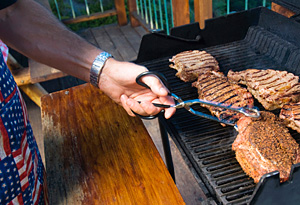Safe Grilling Strategies

Photo: Creatas/Thinkstock
What's the unofficial first day of summer? For TheBestLife.com lead nutritionist Janis Jibrin, MS, RD, it's the first time she catches a whiff of the familiar smoky smell of her neighbor's dinners wafting into her window. It's also a reminder of the joys—and perils—of grilled food.
While grilling is an incredibly lean way to cook, it does have a dark side. Cooking food over a high, open flame can produce carcinogens, or cancer-causing substances. Before you give up on grilling, there are a few ways you can safeguard yourself and still have your grilled chicken, burgers and other summer favorites.First, let's take a look at what's happening with your food. Throwing your grub on the grill can cause:
Heterocyclic Amines (HCAs)
Combine muscle meat with intense heat, and you'll get a chemical reaction that results in the production of these compounds. They're not just found in barbecued meats, though. Pan-frying, electric grilling or broiling can also produce HCAs. So steer clear of blackened and charred meats. Or, opt for plant-based foods, such as vegetables or tofu; they don't contain these chemicals.
Polycyclic Aromatic Hydrocarbons (PAHs)
You'll find these compounds in barbecue smoke. Anything that makes the grill smokier—like fat that drips from the food and hits the coals or flame—produces even more PAHs. Then, the chemical-laden smoke gets absorbed by your food. Unfortunately, these are equal-opportunity chemicals, affecting meats, veggies and bread.
But don't hang up your spatula just yet!
You can minimize your risks of cancer-causing compounds from grilling with these nine targeted grilling techniques:
Will this warning about cancer-causing agents in grilling change your behavior? Share your thoughts in the comments area.
Keep Reading:
The girls' guide to summertime grilling
Grill master Adam Perry's 5 steps to a perfectly grilled steak
The 6 tools you need for barbecue heaven
- Marinate
Using this recipe, scientists from Lawrence Livermore Labs in Livermore, California, eliminated 95 percent of HCAs in poultry. While they're still not sure how it works—it may have to do with the marinade cooling down the meat—any oil-and-vinegar marinade should be protective.
- Flip
Another study from Livermore Labs found that turning burgers every minute reduced HCA formation by up to 99 percent compared to burgers that were flipped every five minutes.
- Microwave
Zapping meat to a half-cooked state before grilling removes some of the substances that react to heat and greatly reduces the chances of creating HCAs.
- Cook on the Cooler Parts
Move your food to the edge of the grill or to a spot where food won't drip directly on the heat source. If your propane or gas grill has a "dual burner," turn one burner off and cook on the other side.
- Buy Lower-Fat Meat
With leaner red meat, chicken and fish, you'll reduce the amount of fat that drips onto the grill and the amount of PAH created.
- Regulate Temperature
The heat should be high enough to cook food thoroughly, but low enough to prevent charring.
- Douse
Use a squirt bottle to douse flames that get too high.
- Avoid Mesquite
Burning this wood generates lots of PAHs. Instead, use oak or hickory.
- Steam Vegetables in Advance
That way, they spend less time on the grill and have less of a chance to absorb smoke.
Will this warning about cancer-causing agents in grilling change your behavior? Share your thoughts in the comments area.
Keep Reading:
The girls' guide to summertime grilling
Grill master Adam Perry's 5 steps to a perfectly grilled steak
The 6 tools you need for barbecue heaven
As a reminder, always consult your doctor for medical advice and treatment before starting any program.



